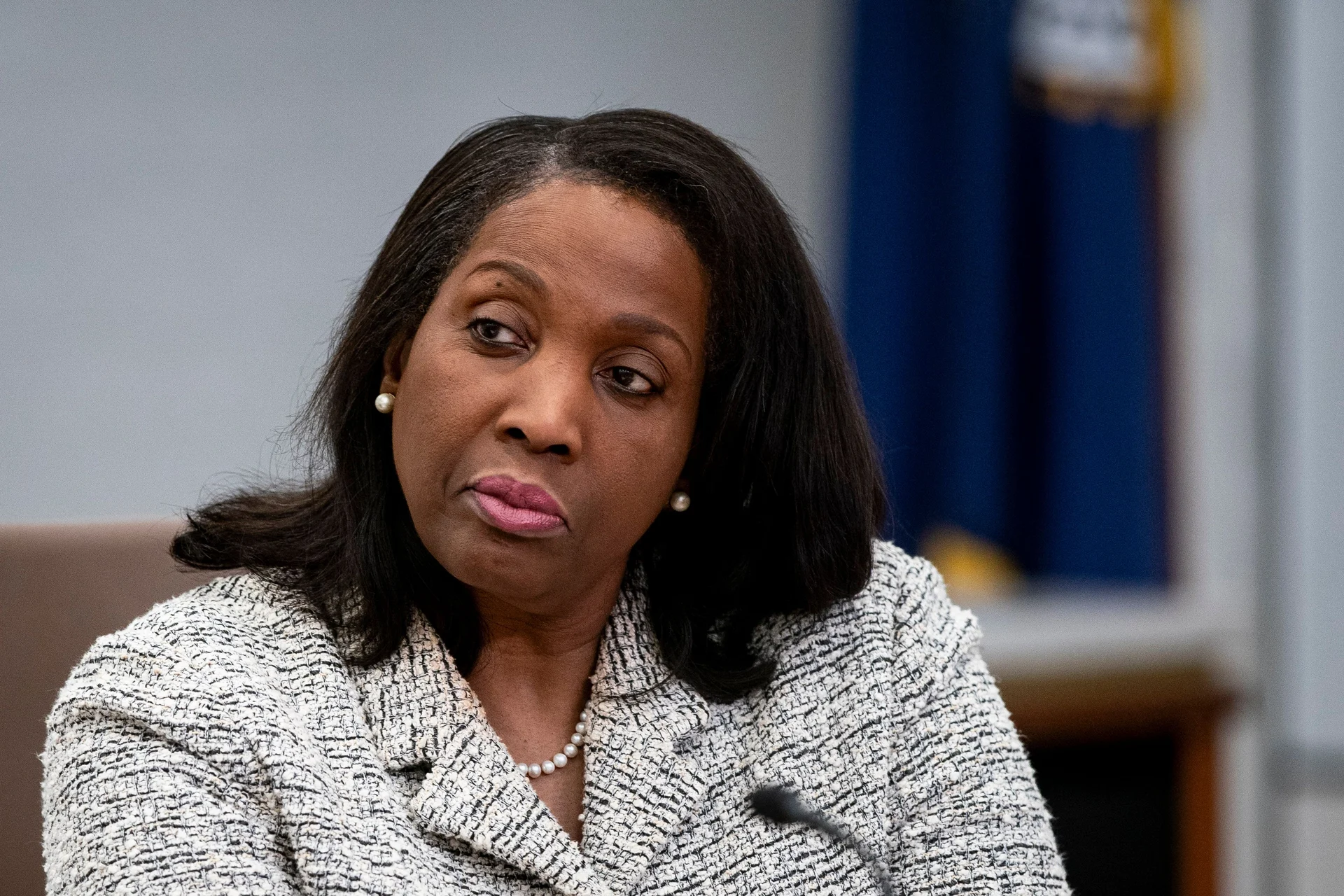In a major legal and political development, a federal court has ruled that former President Donald Trump cannot dismiss Federal Reserve Governor Lisa Cook from her position. The decision not only preserves Cook’s place on the influential Board of Governors but also reinforces the principle of central bank independence at a time when political pressure on monetary policy is mounting. The ruling has far-reaching consequences for governance, the balance of power between political leaders and independent institutions, and the ongoing debate about how much influence presidents should have over the Federal Reserve. It is a decision that reverberates beyond Cook herself, touching on themes of economic stability, judicial authority, and democratic checks and balances.
- Who is Lisa Cook and Why This Case Matters
- The Court’s Ruling Explained
- Trump’s Pushback and Political Strategy
- Lisa Cook’s Role at the Federal Reserve
- Historical Context: Presidential Power vs. Central Bank Independence
- Market Reactions and Economic Impact
- Public Opinion and Political Debate
- Implications for Future Presidents
- What Experts Are Saying
- FAQs
- Why did Trump want to dismiss Lisa Cook?
- What does the federal court ruling mean for the Federal Reserve?
- How long does Lisa Cook’s term last at the Federal Reserve?
- What impact will this ruling have on financial markets?
- Has a president ever dismissed a Federal Reserve Governor before?
- What makes Lisa Cook’s role significant?
- Conclusion
Who is Lisa Cook and Why This Case Matters
Lisa Cook made history in 2022 when she became the first Black woman to serve on the Federal Reserve Board of Governors. Her appointment was celebrated as a landmark for diversity in economics, a field often criticized for lacking inclusivity. Beyond her trailblazing identity, Cook is an accomplished scholar with extensive research on economic growth, innovation, and the effects of violence and discrimination on development.
Trump’s attempt to dismiss her was seen by critics as politically motivated, raising questions about whether presidents could reshape the central bank at will. If successful, such a dismissal could have undermined confidence in the Fed’s independence and its ability to operate without partisan interference. The court’s ruling in favor of Cook not only safeguards her role but also reinforces the precedent that Federal Reserve Governors cannot be removed without clear legal justification.
The Court’s Ruling Explained
The federal court ruled that Lisa Cook’s position is protected under the Federal Reserve Act, which establishes terms for governors and shields them from arbitrary dismissal. Unlike cabinet secretaries or political appointees who serve at the pleasure of the president, Federal Reserve Governors serve fixed terms precisely to ensure that monetary policy decisions remain free from short-term political considerations.
Legal experts point out that this ruling is consistent with past decisions reinforcing institutional independence. The court emphasized that allowing Trump or any president to dismiss a sitting governor without cause would create instability in financial markets, weaken public trust in the Fed, and potentially politicize interest rate decisions. In its written opinion, the court described such an action as “a dangerous precedent with profound implications for economic governance.”
Trump’s Pushback and Political Strategy
Trump has long criticized the Federal Reserve, frequently attacking its decisions during his presidency. He accused the Fed of raising interest rates too aggressively and blamed it for slowing economic growth. In the case of Lisa Cook, Trump’s legal team argued that her appointment was illegitimate and that she was pursuing policies contrary to his economic vision.
Supporters of Trump framed the case as an effort to reclaim presidential authority over what they see as an overly insulated institution. However, opponents viewed it as a direct attack on the independence of the central bank, suggesting that Trump’s motives were less about policy and more about consolidating control.
The political implications of this battle go far beyond Lisa Cook. The outcome could shape Trump’s broader relationship with the financial system, international markets, and even his 2024 campaign narrative. By attempting to dismiss Cook, Trump positioned himself once again as a disruptor willing to challenge institutions he perceives as obstacles.
Lisa Cook’s Role at the Federal Reserve
Cook has been a strong voice for inclusive economic growth and data-driven policymaking. She has focused on how access to innovation and the consequences of systemic discrimination impact overall productivity. Her tenure so far has been marked by efforts to broaden the Fed’s perspectives on economic resilience, labor markets, and inflation dynamics.
Supporters argue that Cook’s expertise provides valuable insights at a time when the U.S. economy faces challenges such as inflationary pressures, global supply chain disruptions, and the looming possibility of recession. Her continued presence on the Board sends a message that diversity of thought and background is essential in crafting effective policy.
Historical Context: Presidential Power vs. Central Bank Independence
The clash between Trump and Cook recalls earlier battles over Federal Reserve independence. Since its founding in 1913, the Fed has been designed to balance accountability with autonomy. While presidents nominate board members, once confirmed, governors serve long terms that outlast election cycles to shield them from political turnover.
This structure has repeatedly been tested. In the 1960s, President Lyndon Johnson pressured Fed Chair William McChesney Martin over interest rates. In the 1970s, President Richard Nixon reportedly leaned on Fed Chair Arthur Burns to keep rates low ahead of his reelection campaign. These interventions have been criticized for fueling inflation and undermining credibility.
By blocking Trump’s attempt to remove Cook, the federal court reaffirmed that the Fed is not just another political arm of the presidency. This case strengthens the firewall between monetary policy and partisan politics, ensuring stability in an era when global markets are sensitive to even the slightest political interference.
Market Reactions and Economic Impact
The financial markets responded positively to the ruling, with analysts suggesting that it reduces uncertainty surrounding the Fed’s governance. Investors often fear that political meddling could lead to erratic interest rate decisions or undermine the central bank’s credibility. By preserving Cook’s role, the court reassured markets that monetary policy would continue to be guided by long-term economic considerations rather than short-term political agendas.
Several economists weighed in on the ruling. Mark Zandi of Moody’s Analytics noted, “The independence of the Federal Reserve is the bedrock of global confidence in the U.S. economy. Any attempt to compromise that independence would be catastrophic.” Similarly, former Fed officials emphasized that Cook’s continued service would help maintain stability during a period of economic volatility.
Public Opinion and Political Debate
Public reaction to the ruling has been divided along partisan lines. Trump supporters argue that the decision represents judicial overreach and strips the president of authority. Meanwhile, Democrats and many independents have praised the ruling as a vital safeguard against authoritarian tendencies.
Opinion polls show that while most Americans are not deeply familiar with the inner workings of the Federal Reserve, they do value economic stability. For many, the court’s decision is seen as a protective measure against uncertainty. It also highlights the broader conversation about the role of experts and technocrats in a democracy where political leaders often seek maximum control.
Implications for Future Presidents
The ruling does more than preserve Lisa Cook’s position; it sets a precedent for how future presidents will interact with the Federal Reserve. The decision makes it clear that attempts to remove governors without cause are unlikely to succeed. This could discourage future administrations from challenging the Fed’s independence, reinforcing the long-term structure of economic governance in the United States.
Moreover, the case signals to international partners that the U.S. remains committed to maintaining the credibility of its central bank. In a globalized economy where U.S. monetary policy impacts trade, investment, and financial flows worldwide, this assurance is crucial.
What Experts Are Saying
Many experts believe this case will be studied in political science and economics classrooms for years to come. Constitutional scholars highlight it as an example of the judiciary stepping in to protect institutional independence. Economists emphasize that it ensures policy continuity.
Janet Yellen, Treasury Secretary and former Fed Chair, stated in a panel discussion, “Lisa Cook represents the best of what the Fed should be—diverse, expert, and independent. The court’s ruling is not about politics, but about preserving trust in our most important economic institution.”
Others, however, caution that political attacks on the Fed are unlikely to stop here. They warn that as the economy continues to be a battleground issue, presidents may find new ways to exert influence, forcing courts to intervene again in the future.
FAQs
Why did Trump want to dismiss Lisa Cook?
Trump argued that Lisa Cook’s appointment was illegitimate and that her policy approach conflicted with his economic vision. Critics say the move was politically motivated and aimed at increasing presidential control over the Federal Reserve.
What does the federal court ruling mean for the Federal Reserve?
The ruling reinforces the independence of the Federal Reserve by establishing that governors cannot be arbitrarily dismissed by presidents. This ensures stability and credibility in monetary policy decisions.
How long does Lisa Cook’s term last at the Federal Reserve?
Federal Reserve Governors serve 14-year terms, though many do not serve the full duration. Lisa Cook’s appointment extends into the 2030s unless she chooses to resign or is removed for legitimate cause as outlined by law.
What impact will this ruling have on financial markets?
Markets responded positively to the ruling, as it reduces political risk and reaffirms the stability of U.S. economic policy. Investors generally prefer the Fed to operate independently of political interference.
Has a president ever dismissed a Federal Reserve Governor before?
Historically, presidents have not dismissed Federal Reserve Governors without cause. Attempts to interfere have typically been informal, through pressure or public criticism, rather than outright legal actions.
What makes Lisa Cook’s role significant?
Cook is the first Black woman to serve on the Federal Reserve Board. Beyond her symbolic role, she is a respected economist whose research focuses on innovation, economic growth, and the effects of systemic discrimination on development.
Conclusion
The federal court’s ruling that Trump cannot dismiss Lisa Cook is more than a personal victory for Cook; it is a defining moment in the ongoing struggle to preserve institutional independence in American democracy. At its core, the case underscores the importance of keeping the Federal Reserve insulated from political turbulence, ensuring that monetary policy remains grounded in economic realities rather than partisan agendas. Lisa Cook’s continued service symbolizes not just progress in diversity but also the resilience of democratic safeguards. In reaffirming the balance of power, the court has sent a clear message: no president, regardless of political standing, can bend independent institutions to their will without consequence.







